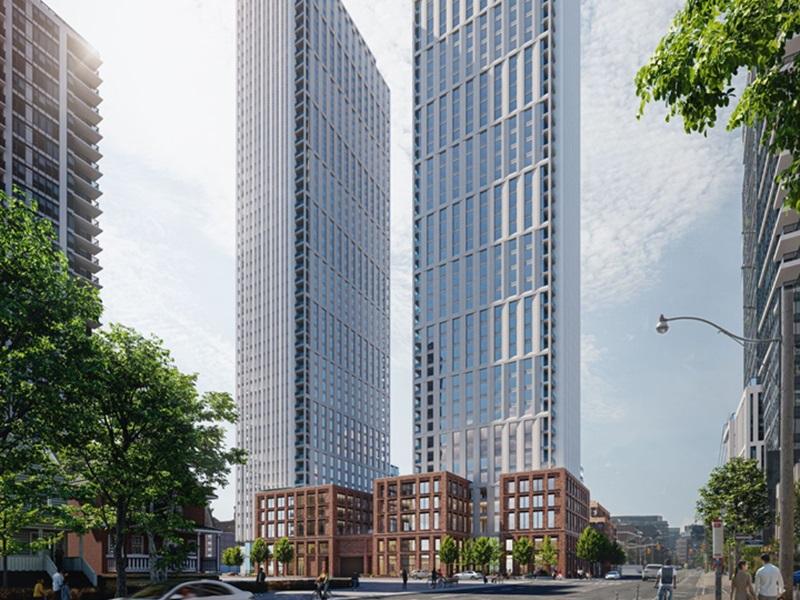
Heart of Burquitlam, which includes the recently launched 50-storey Myriad condominium tower and a 31-storey rental tower under construction. (Courtesy Concert Properties)
The building out of a master-planned community can take up an entire career in the development industry, but Concert Properties’ president and CEO Brian McCauley says the payoff is a full pipeline of projects.
“It builds a predictable development pipeline for a long period of time,” McCauley told RENX. “That’s why master-planned communities are our interest.”
Concert has 10 master-planned communities either completed or underway in the Vancouver, Victoria and Toronto markets.
One of the company’s major focuses right now is in Coquitlam, where work is underway on the Heart of Burquitlam master-planned community.
The development includes the new Bettie Allard YMCA, the recently launched 50-storey Myriad condominium tower – with presales set for October – and a 31-storey rental tower under construction.
The latter building, which includes funding from federal and municipal governments, is scheduled to complete in 2023.
Another six towers, rental and condo, are proposed for a separate master-planned site on nearby Cottonwood Avenue, currently a rental community called Whitgift Gardens.
Those sites will give Concert about 10 to 12 years worth of mixed-use development opportunities in the neighbourhood.
Concert builds both rentals and condos
Concert communities typically include a mix of purpose-built rental and condominium units, plus amenities and commercial uses which complement the residential piece.
Another benefit of master-planned communities is they are a more creative and comprehensive undertaking than a single-site project, said McCauley.
“If you are fortunate enough to be able to get a large enough assembly of properties together, then you can really think about roads and parks and daycares and schools and housing and commercial development and office,” he said.
“It’s really a very unique opportunity to plan a complete community and for us at Concert, one of the things that’s fascinating about that is it gives us the chance to feed the various business lines that we are in today.
“We are in for-sale condominium, we are in purpose-built rental, we’re in residential homes and seniors housing communities, office and industrial properties.
“When you get a large enough piece of property in the right location, it gives you an opportunity to actually deliver all of those uses in various percentages as part of your development.
“And that’s fascinating, because when all of us in the development industry just chase single-site opportunities that come up in the marketplace, it’s really limited most often to a very specific use you can put on that site.
“It could be a high-rise condominium tower, or a high-rise rental tower, but it doesn’t have any of the other opportunities to build a variety of uses.”
Master-planned communities require patience
That said, they are projects that requires patience. McCauley, an architect by training, took on the role of development manager for the company’s first master-planned community, Collingwood Village, in 1994, the year the project broke ground. Concert completed the last building in 2006.
“What’s appealing about them is that they are transformational change opportunities,” said McCauley.
“Typically, there are very few green-field opportunities left, but their previous use is no longer relevant and they give you an opportunity to comprehensively plan and redesign a discrete number of acres.”
The challenge, of course, is the acquisition of that acreage.
Because urban land is limited, often master-planned communities have sprung from under-utilized industrial properties, such as Vancouver’s Olympic Village, False Creek South as well as the north side of False Creek.
Concert recently launched the first phase of former industrial waterfront land in North Vancouver, a four-phase, 12-acre community called North Harbour that will include about 18 mid-rise buildings.
In the 1990s, it developed its second master-planned community, Arbutus Walk, on Vancouver’s west side, the former site of Carling O’Keefe brewery.
More recently, large parcels have opened up by way of shopping malls and sawmills that have outlived their usefulness.
When the recession hit in 2008, McCauley said more commercial landowners realized their sites had become obsolete, that the future belonged to integrated mixed-use density.
Former shopping centre properties redeveloped
In Metro Vancouver, old shopping mall sites that have become major master-planned communities include Oakridge Centre, Brentwood Town Centre and Lougheed Mall.
“Those are currently the next generation of land opportunities where they were under-utilized, auto-oriented surface parking lots, that were well-situated, transit-oriented sites that could be redeveloped. Just about every one of our sites that we work on is an urban infill, transit-oriented site,” he added.
The process is intensely collaborative, often involving all levels of government, politicians, non-profit housing groups and other experts who share big ideas on community planning.
“We have been doing master-planned communities for a long time, but we really increased our interest to buy larger land holdings going back to 2010, 2011, 2012, and what we have on our plate today is a series of large-scale, multi-phased projects,” said McCauley.
“But they’ve taken a long time to get through the municipal approval process. Often, on a large-scale assembly like that you have to do an official community plan amendment and then go through a rezoning process, followed by a phase-by-phase development permit application. So it’s a long grind to get through.”
Concert has completed four master-planned communities, including Collingwood Village and Arbutus Walk in Vancouver, Capital Park in Victoria and Village Gate West in Toronto. It’s building out the last phase of The Creek, beside Science World in Vancouver, a five-building site that integrates with the community plan for the south side of False Creek.
Its 12-acre North Harbour project on the waterfront of North Vancouver has been 26 years in the works. For the North Harbour community, Concert purchased the 12-acre waterfront site in North Vancouver back in 1995, but it didn’t move through an official community plan amendment and rezoning application until 2016.
Construction began on the first phase this year.
Additions to Concert’s rental holdings
Aside from the Heart of Burquitlam project, Concert is also at work on The Kip District in Toronto.
In partnership with the Peterson Group, the company is applying for rezoning on 21 acres of residential land at 57th Avenue and Cambie in Metro Vancouver, a large, purpose-built rental neighbourhood.
They engaged the community and came up with a policy statement to guide the potential redevelopment for the site after council approved a planning program back in 2013.
“It’s a long journey,” said McCauley.
As Concert builds out each phase of its master-planned communities, it adds more residential rental units to its portfolio. McCauley is a big believer that more supply is needed to address the affordability crisis, along with some help from the government for low-income tenants.
“We currently own 5,000 rental homes across the country. And in this pipeline of development, we think we will have about 3,000 more between Vancouver and Toronto.”










